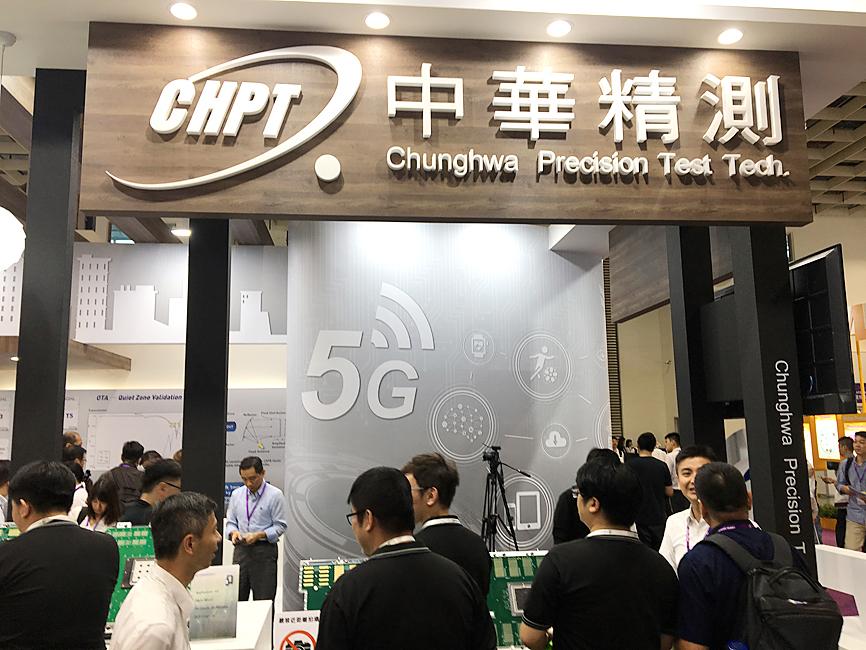Wafer probing service provider Chunghwa Precision Test Technology Co (CHPT, 中華精測) expects revenue to grow quarterly for the remainder of the year, as it is well-positioned to benefit from the robust demand for processors used in 5G smartphones and high-performance computing devices such as data centers.
The growth momentum was disrupted last quarter as CHPT’s engineers were prohibited from visiting customers’ factories for product qualification after the government raised the COVID-19 alert in May to level 3 to curb infections, the company said yesterday.
As the government eased some restrictions this week, the company expects to regain momentum from next month, as 5G-related infrastructure deployment, electric vehicles and remote work continue to stimulate demand.

Photo: CNA
“The COVID-19 outbreak has upended the normal seasonal patterns this year,” CHPT president Scott Huang (黃水可) told an online investors’ conference in Taipei. “The second and third quarters used to be the best quarters for the company. This year, each quarter would be higher than the previous one, probably making the fourth quarter the best quarter of the year.”
For the full year, revenue is expected to surpass last year’s NT$4.23 billion (US$151 million), thanks to growing demand for its wafer probe card business, Huang said.
The outlook for next year is positive, he added.
The company’s top client is expected to contribute more than 30 percent to its total revenue this year, filling the void left by two of its major customers last year, he said.
The wafer probe card business accounted for 35 percent of the company’s overall revenue last quarter, down from 41 percent the previous quarter due to COVID-19 restrictions, the Pingjhen District (平鎮), Taoyuan-based company said.
Net profit contracted 7.3 percent to NT$216 million last quarter from NT$233 million a year earlier, but rose 28.57 percent from NT$168 million in the previous quarter, it said.
Earnings per share dropped to NT$6.16, compared with NT$7.11 a year earlier and NT$5.11 in the first quarter.
Net profit in the first half of the year was NT$384 million, it said.
Gross margin fell to 53.8 percent last quarter from 54.1 percent in the first quarter and 54.1 percent in the second quarter last year.

MULTIFACETED: A task force has analyzed possible scenarios and created responses to assist domestic industries in dealing with US tariffs, the economics minister said The Executive Yuan is tomorrow to announce countermeasures to US President Donald Trump’s planned reciprocal tariffs, although the details of the plan would not be made public until Monday next week, Minister of Economic Affairs J.W. Kuo (郭智輝) said yesterday. The Cabinet established an economic and trade task force in November last year to deal with US trade and tariff related issues, Kuo told reporters outside the legislature in Taipei. The task force has been analyzing and evaluating all kinds of scenarios to identify suitable responses and determine how best to assist domestic industries in managing the effects of Trump’s tariffs, he

TIGHT-LIPPED: UMC said it had no merger plans at the moment, after Nikkei Asia reported that the firm and GlobalFoundries were considering restarting merger talks United Microelectronics Corp (UMC, 聯電), the world’s No. 4 contract chipmaker, yesterday launched a new US$5 billion 12-inch chip factory in Singapore as part of its latest effort to diversify its manufacturing footprint amid growing geopolitical risks. The new factory, adjacent to UMC’s existing Singapore fab in the Pasir Res Wafer Fab Park, is scheduled to enter volume production next year, utilizing mature 22-nanometer and 28-nanometer process technologies, UMC said in a statement. The company plans to invest US$5 billion during the first phase of the new fab, which would have an installed capacity of 30,000 12-inch wafers per month, it said. The

Taiwan’s official purchasing managers’ index (PMI) last month rose 0.2 percentage points to 54.2, in a second consecutive month of expansion, thanks to front-loading demand intended to avoid potential US tariff hikes, the Chung-Hua Institution for Economic Research (CIER, 中華經濟研究院) said yesterday. While short-term demand appeared robust, uncertainties rose due to US President Donald Trump’s unpredictable trade policy, CIER president Lien Hsien-ming (連賢明) told a news conference in Taipei. Taiwan’s economy this year would be characterized by high-level fluctuations and the volatility would be wilder than most expect, Lien said Demand for electronics, particularly semiconductors, continues to benefit from US technology giants’ effort

‘SWASTICAR’: Tesla CEO Elon Musk’s close association with Donald Trump has prompted opponents to brand him a ‘Nazi’ and resulted in a dramatic drop in sales Demonstrators descended on Tesla Inc dealerships across the US, and in Europe and Canada on Saturday to protest company chief Elon Musk, who has amassed extraordinary power as a top adviser to US President Donald Trump. Waving signs with messages such as “Musk is stealing our money” and “Reclaim our country,” the protests largely took place peacefully following fiery episodes of vandalism on Tesla vehicles, dealerships and other facilities in recent weeks that US officials have denounced as terrorism. Hundreds rallied on Saturday outside the Tesla dealership in Manhattan. Some blasted Musk, the world’s richest man, while others demanded the shuttering of his